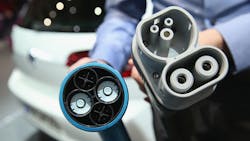Electric Cars May Be Cheaper Than Gas Guzzlers in Seven Years
Electric cars may be cheaper than their petroleum counterparts by 2025 if the cost of lithium-ion batteries continues to fall.
Some models will cost the same as combustion engines as soon as 2024 and become cheaper the following year, according to a report by Bloomberg New Energy Finance. For that to happen, battery pack prices need to fall even as demand for the metals that go into the units continues to rise, the London-based researcher said on Thursday.
The clamor to roll out electric vehicles has grown louder as countries and companies race to clean up smog in their cities and hit ambitious climate goals set by the Paris Agreement. U.K. lawmakers started an inquiry into the market in September, probing the necessary infrastructure and trying to determine whether to bring forward the 2040 deadline to end the sale of gasoline and diesel cars.
With incentives, the U.K. could lower its automotive trade deficit by 5 billion pounds (US$7 billion), the Green Alliance reported. The World Wildlife Fund said that phasing out diesel and petrol cars earlier could add an extra 14,000 jobs to the industry. In separate reports this week, both groups urged Britain to bring forward the ban on petroleum-fueled cars to 2030.
China, the world’s biggest polluter, is looking to lead the world in electric-vehicle adoption with the government implementing production quotas aimed at increasing sales. The billionaire founder of Zhejiang Geely Holding Group Co., Li Shufu, bought a 7.3 billion euro ($9 billion) stake in Daimler AG last month.
The expected increase in mass manufacturing of lithium-ion storage should help drive battery prices to as low as $70 a kilowatt hour by 2030, BNEF said. Battery packs averaged about $208 a kilowatt hour in 2017, squeezing profit margins and representing some two fifths of the total costs of electric vehicle.
"Electric vehicle sales will continue to ramp up in the coming years but battery prices still need to decline further for real mass market adoption," said Colin McKerracher, transport analyst at BNEF. "If battery material costs keep rising sharply this could push back the crossover point."
By Jeremy Hodges
About the Author
Bloomberg
Licensed content from Bloomberg, copyright 2016.
